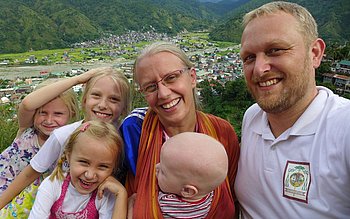Community Supported Agriculture

Producing sustainable, regional, and seasonal food
Nicola Maier
We lived with our four children in the Cordillera, a mountainous region of the Philippines, for five years. When we went shopping in the market, we deliberately chose to buy regional and seasonal products from the women farmers there.
We are now back in Germany and have been living for two years in the Vauss-Hof Community near Paderborn, a CSA (community supported agriculture) organic farm with cows, which belongs to friends of ours. We work together with other members of the cooperative to grow vegetables in open fields and in four polytunnels. Each week, nearly 100 families come to collect their share of the CSA produce. This week, for example, there were cabbages, purslane, carrots, and potatoes.
Everyone pitches in
Working together in the CSA reminds us of the ugugfu principle, a cooperative form of neighbourhood support in the Cordillera which involves all the farmers in a village working the fields together. Here in Germany, we are continuing to practise the sustainable lifestyle which we adopted in the Philippines. In the CSA scheme we invest in growing food locally, rather than just buying the harvested produce.
We all do a share, according to our ability, of the work of sowing, weeding, repairing rabbit fences, producing compost, watering crops, and finally harvesting the produce. Ultimately, of course, how successful we are always depends on the weather. If the summer is either very dry or a wash-out, not only does the gardener lose sleep, but everyone worries about the prospect of a poor harvest.
Slow down and be amazed
The CSA farm is also a place of learning for school classes or groups of adults. My aim in our educational work is for people to slow down in life, to discover nature for themselves and wonder at it, and to get a feel for it, literally. So they learn from practical experience how cultivation affects the harvest. And they learn specific things like the use of natural methods of pest control and natural fertilisation of the soil. When containers slowly get filled up with Colorado potato beetles which have been picked off the plants by hand, they have to think about what to do with all the beetles – and what would happen to the beetles if the potatoes were grown conventionally.
For children and adults alike, working in the fields using all their senses has a much greater impact than a biology lesson or a TV programme. And when they’ve done some harvesting, even those who are most averse to eating vegetables relish biting into a kohlrabi.
Patience and openness are called for
I also repeatedly find myself “playing with” the CSA farm as a tangible place where people can learn about climate justice. But CSA is not child's play. Members of the cooperative sometimes leave because it is often difficult to make seasonal vegetables from the region tasty for all the members of the family who are sitting round the dinner table. We have a long way to go and it requires considerable openness on the part of the whole CSA community. We often need to introduce people gently, when they are interested, and to give them a chance to persuade people at home about the merits of the CSA approach.
That is why I would like to take this opportunity to encourage everyone to join a CSA project somewhere in the world. In this way, we can each work to ensure that the land on our doorstep is cultivated sustainably. And together with others, in a spirit of solidarity, we can understand and shape the way things work globally.
Nicola and Christian Maier were with their family in the Philippines from 2012 to 2017, serving as professional development workers. (published in transfer volume 1/2020)
